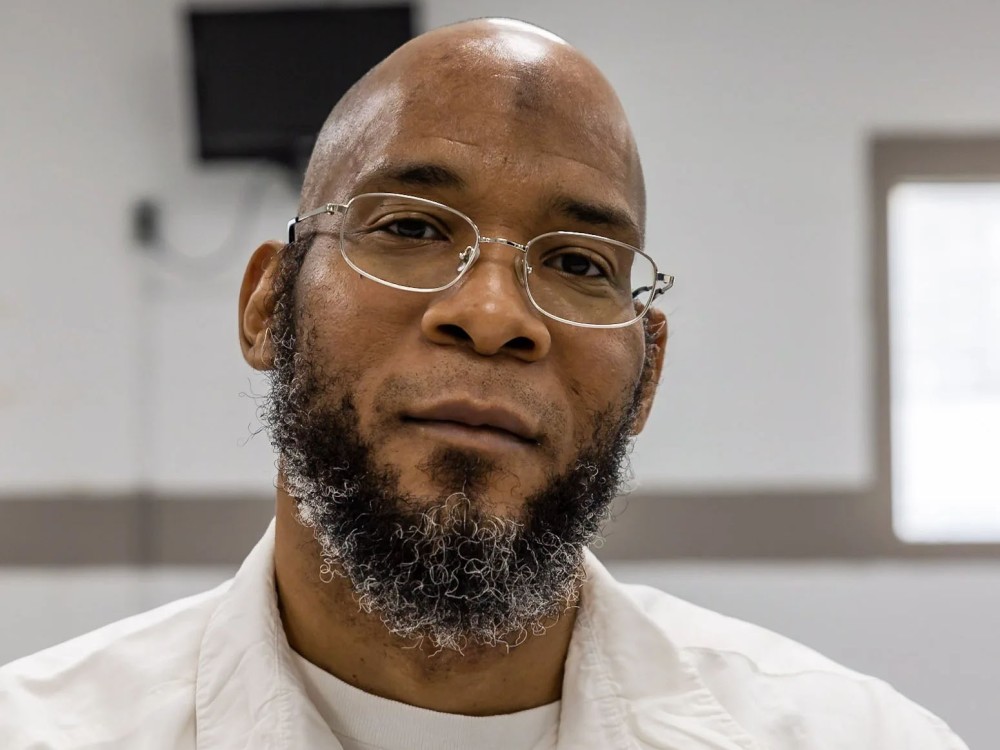Interfaith advocates urge clemency for 'death row imam' a day before his execution

Marcellus Williams in prison in Missouri. (Photo courtesy of the Marcellus Williams legal team)
Marcellus “Khaliifah” Williams, an imam at Missouri’s Potosi Correctional Center, was executed on Tuesday, even as his lawyers and advocates continued to argue his trial was plagued with racial bias and procedural errors.
The Missouri Supreme Court met Monday to discuss the arguments in Williams’s case, a day before his execution.
Both the Innocence Project and the Council on American-Islamic Relations (CAIR) had been urging the public to contact Governor Parson’s office in Missouri to stay the execution.
“He’s the lead Muslim religious leader for Muslims in his prison. And he’s by all reports, you know, a respectful and respectable man who has made the most of his horrible situation and does not, should not be dying for a crime he did not commit,” said Edward Mitchell, national deputy director of CAIR.
An interfaith letter, signed by 69 Muslim, Christian, and Jewish faith leaders, urged Governor Parson to grant Williams clemency.
“As an imam, Marcellus serves not only his flock, a group of men, many of whom have been abandoned by society and in desperate need of guidance and strength, but the institution as well — by providing a vital network of support for the prisoners,” reads the letter.
Williams, 55, converted to Islam during the 24 years he has spent on Missouri’s death row, after being convicted of the murder of Felicia Gayle, a former reporter found stabbed in her home in 1998. He has maintained his innocence through several failed appeals and in the face of an earlier, stayed execution date.
In 2017, then-Governor Eric Greitens blocked Williams’s execution date when evidence of an unknown individual’s DNA was found on the murder weapon and there was no trace of Williams’ DNA. Greitens appointed a board of inquiry to review evidence for the case. In June 2023, current Governor Michael Lynn Parson dissolved the board without allowing them to conclude, and Attorney General Andrew Bailey appointed a new execution date.
Earlier this year, Democratic St. Louis County Prosecuting Attorney Wesley Bell filed a motion to overturn Williams’s conviction based on new DNA evidence that he argued at the time would exonerate Williams. However, the DNA testing was found to be spoiled due to mishandling of the weapon by the prosecution.
Unable to use the DNA evidence, advocates for Williams, including the Midwest Innocence Project, negotiated a plea deal with the prosecutor, in which Williams would not admit guilt but would accept a sentence of life without parole. Judge Bruce Hilton agreed to the deal, as did the victim’s family, but Bailey fought the agreement, and the Missouri Supreme Court overturned it.
In a final attempt to stay the execution, Williams’s legal team argued Monday that the jury selection process was racially biased, pointing to the 11 White people selected for the jury and the exclusion of at least one potential juror based on race.
“At the evidentiary hearing on August 28, the prosecutor testified that his removal of at least one Black prospective juror at Mr. Williams’ trial was based ‘in part’ on the fact that he was Black,” according to the statement made by the Innocence Project.
Tricia Rojo Bushnell, an attorney representing Williams, corroborated that report, saying in an interview on Monday that the prosecutor had, during testimony, “confessed that at least one juror he struck, in part because of his race, because he was also a young Black man that looked like the defendant.”
She also pointed to the use of incentivized testimonies in Williams’s original trial, noting both witnesses who incriminated Williams were convicted of felonies and seeking a reward. Due to the significance of the prosecutor conceding error and the victim’s family supporting a sentence of life without parole, Bushnell believes Williams should not have been executed.
“The question is what are we pursuing? What is the Attorney General pursuing? Because the community has made clear through their duly elected prosecutor, because the family has made clear, this is not what everyone wants. Executing Marcel Williams is not justice,” said Bushnell.
Williams is the third person executed in Missouri this year and the 15th nationwide.
More than 107,000 people contacted Governor Parson through calls, emails, and tweets, and more than 600,000 people signed the Innocence Project’s petition to stop Williams’s execution, according to the Innocence Project’s press office. —Religion News Service




